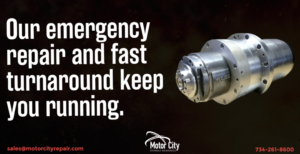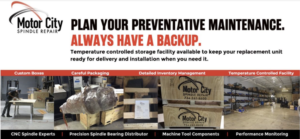
Understanding CNC Spindles: The Heart of Your Machine Tool
In the world of CNC (Computer Numerical Control) machining, where precision and performance are paramount, one component stands out as the true powerhouse of the operation — the spindle. Often referred to as the “heart” of a CNC machine tool, the spindle plays a central role in shaping raw materials into precise and complex parts. Whether you’re cutting metal, wood, plastics, or composites, your spindle’s performance determines the quality, speed, and efficiency of the job.
In this post, we’ll break down what a CNC spindle is, the different types, how it works, and what you should consider when selecting one for your machine.
What Is a CNC Spindle?
At its core, a CNC spindle is a rotating component that holds and drives the cutting tool. It’s mounted on the machine’s head and powered by an electric motor. The spindle’s rotation speed (RPM), torque, and power directly impact cutting performance and surface finish.
Spindles are critical in both milling and routing machines, and they must withstand high radial and axial forces while maintaining rigidity and accuracy.
Key Components of a CNC Spindle
A typical CNC spindle consists of the following:
-
Motor: Provides the rotational force. Can be directly coupled or belt-driven.
-
Bearings: Maintain precise alignment and reduce friction during rotation.
-
Housing: Encloses the spindle and provides structural support.
-
Tool Holder or Collet: Securely holds the cutting tool in place.
-
Cooling System: Keeps the spindle at optimal temperature (air-cooled or liquid-cooled).
Types of CNC Spindles
Understanding the different types of spindles helps in choosing the right one for your needs.
1. Belt-Driven Spindles![]()
-
Powered via a belt connected to an external motor.
-
Easier to repair and maintain.
-
Tend to be noisier and bulkier.
-
Ideal for heavy-duty, lower-speed applications.
2. Integral Motor Spindles (Built-in)
-
The motor is built directly into the spindle housing.
-
Offers higher speed and precision.
-
Quieter operation with reduced vibration.
-
Common in high-speed machining environments.
3. Direct-Drive Spindles
-
Motor is connected directly to the spindle shaft without belts or gears.
-
Offers excellent efficiency and responsiveness.
-
High torque and minimal mechanical losses.
-
More expensive but ideal for high-performance applications.
Choosing the Right Spindle: What to Consider
When selecting a CNC spindle, consider the following factors:
-
Material Type: Harder materials require higher torque and lower speeds.
-
Spindle Speed (RPM): Higher RPMs allow finer finishes on softer materials.
-
Power Output: More power means the ability to handle more demanding jobs.
-
Tooling Compatibility: Make sure the spindle fits your tool holders or collets.
-
Cooling Requirements: Air-cooled is simpler, but water-cooled offers better thermal stability.
-
Duty Cycle: Industrial spindles are rated for continuous operation; hobbyist models may not be.
Maintenance Matters
A spindle’s performance can degrade over time if not properly maintained. Regular lubrication, cleaning, bearing inspection, and alignment checks are essential to ensure long life and consistent performance.
Neglecting spindle maintenance can lead to chatter marks, tool breakage, or even catastrophic machine damage. Motor City Spindle Repair has a plethora of machine preventative maintenance options available for you. We are ready to help diagnose your spindle failures and increase the overall lifespan of your units.
Final Thoughts
The CNC spindle is undeniably the heart of any machine tool. It brings the power, precision, and control needed to transform raw material into exact parts. Whether you’re a seasoned machinist or a newcomer setting up your first shop, understanding your spindle’s capabilities and care requirements is key to unlocking the full potential of your CNC machine.
Choosing the right spindle isn’t just a technical decision — it’s an investment in accuracy, productivity, and the long-term success of your machining operations.
CONTACT US ANYTIME IF YOU’D LIKE TO CHAT WITH OUR EXPERTS OR STOP BY OUR 25,000 SF MANUFACTURING FACILITY LOCATED IN DEARBORN, MICHIGAN!(734) 261-8600 OR EMAIL US AT
SALES@MOTORCITYREPAIR.COM
*Quotations are 100% free of charge
*All quotes are accompanied by a detailed failure analysis report
*We frequently repair spindles in 2-5 business days in emergency situations
*Normal time averages 1-3 weeks for standard repairs
*We keep precision bearings, seals, o-rings, encoders, and other commonly replaced spindle parts in stock and on hand
*Always available 24 hours a day and 7 days a week for emergency repair service
*We deliver the repaired product to you
*Our repairs are balanced, test ran, and certified with a full 1 Year Warranty
*We repair or build new depending on your needs
*Guaranteed cost savings
Need a FREE ESTIMATE? Click HERE To view our most recent blog post, click HERE Have questions about ballscrews? Check out our BALL SCREW WEBSITE




